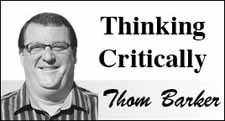Last week I was struggling to decide what to write about in this space. There were so many possibilities: the comet that flew too close to the sun; an experimental breakthrough in the search for a mechanism of abiogenesis; a promising new treatment for cancer; the federal government's new legislation that makes great strides toward prescription medicine safety, but fails to address "natural" health products; and the list goes on.
Then, Thursday December 5, 2013 happened. A day that will forever be remembered as the moment in history one of the most inspirational leaders of our time, perhaps of all time, died.
For at least 24 hours of the news cycle, there was no civil war in Syria, no aftermath of Typhoon Yolanda, no PMO-Senate scandal, no Rob Ford, no wrangling over pipelines, no oilsands controversy, no Obamacare, no global free trade deal, no railway safety concerns.
There was only Nelson Mandela. Madiba. Tata. The Lincoln of Africa. The great reconciliator. Terrorist. Revolutionary. President. Nobel Peace Laureate. The long walk to freedom.
The tributes poured in from around the globe, from Tea Party republicans to North Korea's Kim Yong Nam. No doubt some remembrances were hollow gestures; despite the seemingly unanimous love for the man, he had, and still has, many enemies.
But how many leaders ever achieve the greatness and respect that even (most of) their enemies dare not stand up and be counted for fear of "being on the wrong side of history," a phrase that was spoken frequently in the past seven days?
During the last week, pretty much everything that can be said about the life and times of Mandela has been and continues to be said.
For me, one phrase stands out. When current South African president Jacob Zuma announced Mandela's death, he summed up the (nearly) universal appeal of his friend and mentor by saying, "We saw in him, what we seek in ourselves."
Mandela's legacy as the dismantler of Apatheid is secure, but perhaps his greatest legacy will be as inspiration for more people to seek in ourselves the humility, patience, forgiveness, dedication and morality he came to represent while acknowledging he did not always live up to them himself.
The passing of a truly great human being is a time of grief and celebration that turns into an opportunity for reflection and action. For all the progress South Africa has made in terms of political freedom and human rights, it remains a very troubled country.
And what of Canada? I remember well those years leading up to and following Mandela's release. I was attending university. I played in bands that participated in "Rock Against Racism" events. Those of us on the centre to left of the political spectrum did not care much for Brian Mulroney and his Progressive Conservative government, but left and right alike were united in the anti-apartheid cause.
It was a proud time to be Canadian. Do we still occupy that moral high ground? I don't know, but the real question is, am I personally doing enough to keep us there.
We are still struggling with our own truth and reconciliation process.
We rank miserably low among OECD countries in terms of child poverty and the gap between rich and poor is growing.
The day after Mandela died, December 6, was the 24th anniversary of the "Montreal Massacre" in which 14 women were gunned down at Ecole Polytechnique, a stark reminder that, while we haven't had another killing spree its equal, we have made virtually no progress in the problem of violence against women.
These are problems for which there are no partisan solutions and, while we all acknowledge their existence, we are perhaps more politically divided than any time in our history, at least that I can remember. Of course, that may also just be the effect of my rose-coloured glasses; I can never be quite sure.
Nevertheless, for a moment, albeit brief, the Parliament of Canada was united December 5 (with the exception of one MP) in a display of solidarity that gave me hope that perhaps our commonalities are truly greater than our differences.
Sometimes having hope that things can change seems like a proposition too daunting to entertain. Sometimes we just need to be reminded that they can and do.
Nelson Mandela was an example of not only the fact of that, but of how to get there through perseverance, tolerance and good will.




